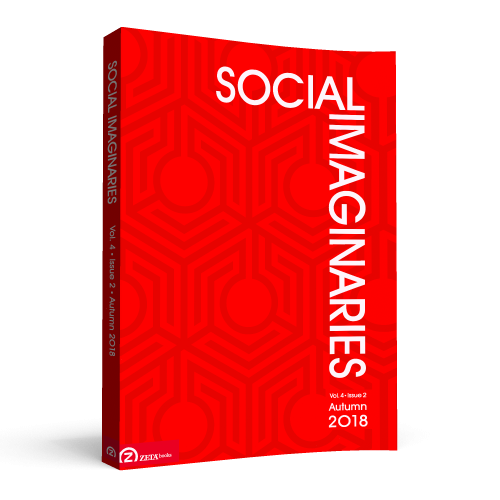Social Imaginaries
Social Imaginaries
Publishing House: Zeta Books
Subject(s): Politics / Political Sciences, Anthropology, Philosophy, Social Sciences, Political Philosophy, Social Philosophy, Political Theory, Sociology, Phenomenology, Hermeneutics, Sociology of Religion
Frequency: 2 issues
Print ISSN: 2393-2503
Online-ISSN: 2457-2926
Status: Ceased Publication
- 2018
- 2019
- Issue No. 1/4
- Issue No. 2/4
- Issue No. 1/5
- Issue No. 2/5
Articles list
{{ article.TitleOriginalLanguage }}
{{ article.TitleOriginalLanguage }}
({{ article.TitleEnglish }})
- Publication: {{ article.Publisher }} ({{ article.Issue }})
- Author(s): {{ article.Authors }}
- Contributor(s): {{ article.Contributors }}
- Language: {{ article.Language }}
- Subject(s): {{ article.Subjects }}
- Issue: {{ article.Issue }}
- Page Range: {{ article.PageRange }}
- No. of Pages: {{ article.NumberOfPages }}
- Keywords: {{ article.Keywords }}
- Summary/Abstract: {{ article.SummaryAbstract }}
- Price: {{ common.currency(article.Price) }}
Short Description
Social Imaginaries inquires into complexes of cultural meaning and cultural projects of power. It presupposes an understanding of society as a political institution, which is formed — and forms itself — in historical constellations, on the one hand, and through encounters with other cultures and civilizational worlds, on the other. An emphasis on “imaginaries” points to several interrelated trends: it reveals the modern concern with — and emphasis on — the social imagination as truly creative rather than reproductive; it highlights the phenomenon of collectively instituted meaning and its inter-cultural variations; it provides a corrective to a one-sided focus on ‘reason’ as the central tenet (or promise) of modernity; finally, it underscores the ongoing, albeit incomplete, hermeneutical turn in the human sciences. Social Imaginaries reflects on the human condition in modernity, which, amongst other things, ought to be centrally concerned with theoretical elaborations of and responses to the ecological devastation of the natural world. It pursues intersecting debates on (inter)cultural and historical varieties of meaning, power and socially instituted worlds.
The Journal aims to: Foster challenging and innovative research on modernity and multiple modernities especially with reference to inter-civilizational horizons. • Interrogate varieties of modernity and the formation of political freedom. • Critically engage with political ecology, and theories, philosophies and cultural histories of nature, broadly construed. • Encourage phenomenological and hermeneutical analyses, especially those that address social, historical, political, cultural and ecological dimensions of the world. • Nurture a particular comparative emphasis on civilizational world-views, inter-civilizational encounters and historical trajectories, especially in regard to East Asia and the West. • Publish high quality research that truly reflects an international and multi-regional scope in the field of social and political imaginaries, broadly conceived. To secure the quality of the research we publish, the journal will be peer reviewed. • Publish research by both leading and emerging scholars in social theory and political philosophy, phenomenology and hermeneutics, world history and historical sociology.
Social Imaginaries invites contributions from social theory, historical sociology, political philosophy, political theory, phenomenology, hermeneutics, and, more broadly, cultural studies, anthropology, geography that critically advance our understanding of the human condition in modernity.
Editorial board
Coordinating Editors: Suzi Adams (Flinders University, Australia); Jeremy CA Smith (Federation University Australia, Australia)
Editorial Collective: Suzi Adams (Flinders University, Australia); Paul Blokker ( Charles University in Prague, Czech Republic); Natalie Doyle (Monash University, Australia); John Krummel (Hobart and William Smith Colleges, USA); Jeremy Smith (Federation University Australia, Australia).
Editorial Assistants: Nathan Dalton (Flinders University, Australia); Sean Morrow (Monash University, Australia); George Sarantoulias (Flinders University, Australia).
Editors-at-Large: Johann P. Arnason (La Trobe University, Australia/ Charles University, Czech Republic); Craig Calhoun (Berggruen Institute, USA); Fred Dallmayr (Notre Dame University, USA); Vincent Descombes (EHESS, France/ University of Chicago, USA); Charles Taylor (McGill University); George Taylor (University of Pittsburgh, USA); Peter Wagner (University of Barcelona, Spain); Bernhard Waldenfels (Bochum University, Germany).
Editorial Advisory Board: Chiara Bottici (New School for Social Research, USA); Craig Browne (University of Sydney, Australia); Ivan Chvatík (Centre for Theoretical Studies/ Patočka Archives, Czech Republic); Marcel Gauchet (École des Hautes Études en Sciences Sociales, France); Stathis Gourgouris (Columbia University, USA); Dick Howard (Stony Brook University, USA); Wolfgang Knöbl (Hamburg Institute for Social Research, Germany); Kwok-ying Lau (Chinese University of Hong Kong, China); Karel Novotny (Charles University, Czech Republic); Mats Rosengren (Uppsala University, Sweden); Hans Rainer Sepp (Fink Archives, Freiburg University, Germany); Kate Soper (London Metropolitan University, UK); Ingerid Straume (Oslo University, Norway); Ted Toadvine (University of Oregon, USA); Lubica Učnik (Murdoch University, Australia).
Social Media Co-ordinator: Erin Carlisle (Flinders University, Australia)

